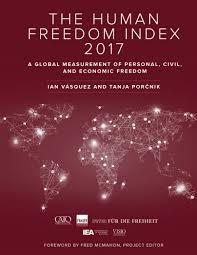
Human freedom is a social concept that recognizes the dignity of individuals and is defined here as negative liberty or the absence of coercive constraint. Because freedom is inherently valuable and plays a role in human progress, it is worth measuring carefully. The Human Freedom Index is a resource that can help to more objectively observe relationships between freedom and other social and economic phenomena, as well as the ways in which the various dimensions of freedom interact with one another. The report is co-published by the Cato Institute, the Fraser Institute, and the Liberales Institut at the Friedrich Naumann Foundation for Freedom.
The index published here presents a broad measure of human freedom, understood as the absence of coercive constraint. It uses 79 distinct indicators of personal and economic freedom in the following areas:
- Rule of Law
- Security and Safety
- Movement
- Religion
- Association, Assembly, and Civil Society
- Expression and Information
- Identity and Relationships
- Size of Government
- Legal System and Property Rights
- Access to Sound Money
- Freedom to Trade Internationally
- Regulation of Credit, Labor, and Business
The HFI is the most comprehensive freedom index so far created for a globally meaningful set of countries. The HFI covers 159 countries for 2015, the most recent year for which sufficient data are available. The index ranks countries beginning in 2008, the earliest year for which a robust enough index could be produced.
On a scale of 0 to 10, where 10 represents more freedom, the average human freedom rating for 159 countries in 2015 was 6.93. Among countries included in this report, the level of freedom decreased slightly (−0.05) compared with 2014, with 61 countries increasing their ratings and 97 decreasing. Since 2008, the level of global freedom has also decreased slightly (−0.12), with about half of the countries in the index increasing their ratings and half decreasing.
The top 10 jurisdictions in order were Switzerland, Hong Kong, New Zealand, Ireland, Australia, Finland, Norway, Denmark, and, tied at 9th place, the Netherlands, and the United Kingdom. Selected countries rank as follows: Canada (11), Sweden (13), Germany (16), the United States (17), Japan (27), South Korea (29), France (33), Italy (35), Chile (37), South Africa (68), Mexico (73), Indonesia (78), Turkey (84), Kenya (89), Malaysia (97), India (102), United Arab Emirates (116), Russia (126), China (130), Nigeria (133), Pakistan (141), Zimbabwe (146), Saudi Arabia (149), Iran (154), Egypt (155), Venezuela (158), and Syria (159).
Out of 17 regions, the highest levels of freedom are in Western Europe, Northern Europe, and North America (Canada and the United States). The lowest levels are in the Middle East and North Africa, Eastern Europe (Moldova, Russia, and Ukraine), South Asia, and sub-Saharan Africa. Women-specific freedoms, as measured by seven indicators in the index, are strongest in five European regions (Central Europe and the Baltics, Western Europe, Northern Europe, Eastern Europe and Southern Europe) and North America and are least protected in the Middle East and North Africa, South Asia, and sub-Saharan Africa.
Countries in the top quartile of freedom enjoy a significantly higher per capita income ($38,871) than those in other quartiles; the per capita income in the least-free quartile is $10,346.
The HFI finds a strong correlation between human freedom and democracy. Hong Kong is an outlier in this regard.
The findings in the HFI suggest that freedom plays an important role in human well-being, and they offer opportunities for further research into the complex ways in which freedom influences, and can be influenced by, political regimes, economic development, and the whole range of indicators of human well-being.










Add new comment